Saturday, July 08, 2006
Hi: Here is a short journal of my time with Semester at Sea this summer (two weeks, from Honolulu to Taipei). Most of it was created on the ship, in the middle of the Pacific, as we sailed from Hawaii to Taiwan.
With blogs, you must read FROM THE BOTTOM UP (that is, the first postings are at the bottom) in order to read it chronologically.
Comments? Write to me. DTG
**********************
July 6: Last full day in Taipei before my flight home. The morning included the Chinese Opera Company, a training school for the acrobats, actors, singers, and behind-the-scenes people who perform in the Chinese operas; we got a full explanation and tour, visit to the museum, demonstration by the acrobats, and an hour-long performance of one of the classical operas.

Following the opera, I taxied to my hotel to drop my bags, and then accompanied (rather, was accompanied by) two of the professors from S@S, a Chinese-American musicologist and a specialist in Asian art. Jing Jing took us to a first-rate Chinese restaurant for lunch (we passed on the [no kidding] "Chicken testicles with bean curd") then we went over to the National Palace Museum, the largest collection of Chinese art in the world. The museum's contents came out of the Forbidden City (Bejing) in the early 1930s for safekeeping (fleeing the Japanese), and were consequently kept there after the Communists got hold of China. The collection is so large --14,000 crates traveled 5,000 miles, arriving in Taiwan in 1948-- that it could be rotated every six months for 30 years without ever repeating an object.


Nancy's explanations and Jing Jing's native perspective enriched the visit enormously. From there, off to buy some Chinese silks (again, thanks only to Jing Jing's command of the language) and home through the hustle and bustle of modern Taipei to the hotel for a shower.
The students will stay in Taiwan for another two days, then head for Singapore. They were an able mix of students from smaller colleges (Reed, Rowan, Rollins) and major research universities (Hopkins, Yale, La Jolla, UCLA, USC, Colorado, Michigan, Miami, Florida, Duke, Penn State, Oregon, Columbia). Most of them were serious students, eager to combine the academic classroom work with the special "in field" experience that Semester at Sea provides; a few were typical college jerks set on "hanging out" and "having a good time" exclusively. We will eventually weed those types out in order to insure the academic integrity of this program.
Dinner at the Shanghai Café at the hotel included a tasting menu of extraordinary items, many of them unidentifiable or put together in unfamiliar combinations; one was a delicious shark fin soup with enoki and oyster mushrooms with rice noodles.
Looooooooooong trip home (27 hours total), but the whole experience was worth it. I'm very much looking forward to "my" voyage next summer, up and down the Pacific Coast of Central and South America, from Mexico to Chile.
With blogs, you must read FROM THE BOTTOM UP (that is, the first postings are at the bottom) in order to read it chronologically.
Comments? Write to me. DTG
**********************
July 6: Last full day in Taipei before my flight home. The morning included the Chinese Opera Company, a training school for the acrobats, actors, singers, and behind-the-scenes people who perform in the Chinese operas; we got a full explanation and tour, visit to the museum, demonstration by the acrobats, and an hour-long performance of one of the classical operas.

Following the opera, I taxied to my hotel to drop my bags, and then accompanied (rather, was accompanied by) two of the professors from S@S, a Chinese-American musicologist and a specialist in Asian art. Jing Jing took us to a first-rate Chinese restaurant for lunch (we passed on the [no kidding] "Chicken testicles with bean curd") then we went over to the National Palace Museum, the largest collection of Chinese art in the world. The museum's contents came out of the Forbidden City (Bejing) in the early 1930s for safekeeping (fleeing the Japanese), and were consequently kept there after the Communists got hold of China. The collection is so large --14,000 crates traveled 5,000 miles, arriving in Taiwan in 1948-- that it could be rotated every six months for 30 years without ever repeating an object.


Nancy's explanations and Jing Jing's native perspective enriched the visit enormously. From there, off to buy some Chinese silks (again, thanks only to Jing Jing's command of the language) and home through the hustle and bustle of modern Taipei to the hotel for a shower.
The students will stay in Taiwan for another two days, then head for Singapore. They were an able mix of students from smaller colleges (Reed, Rowan, Rollins) and major research universities (Hopkins, Yale, La Jolla, UCLA, USC, Colorado, Michigan, Miami, Florida, Duke, Penn State, Oregon, Columbia). Most of them were serious students, eager to combine the academic classroom work with the special "in field" experience that Semester at Sea provides; a few were typical college jerks set on "hanging out" and "having a good time" exclusively. We will eventually weed those types out in order to insure the academic integrity of this program.
Dinner at the Shanghai Café at the hotel included a tasting menu of extraordinary items, many of them unidentifiable or put together in unfamiliar combinations; one was a delicious shark fin soup with enoki and oyster mushrooms with rice noodles.
Looooooooooong trip home (27 hours total), but the whole experience was worth it. I'm very much looking forward to "my" voyage next summer, up and down the Pacific Coast of Central and South America, from Mexico to Chile.
**********
July 5: Keelung-Taipei
Yesterday filled us with sights and sounds and smells, all of them a rich combination of the very old and the very new. Keelung, a port city, displays all of the energy, crowding, and bustle of most port cities.
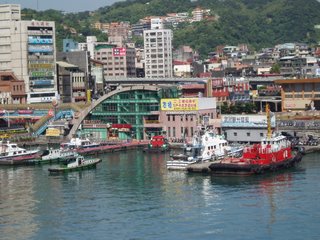
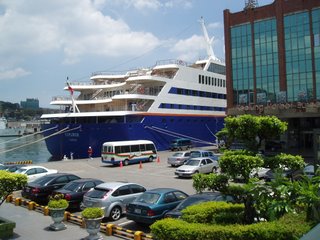
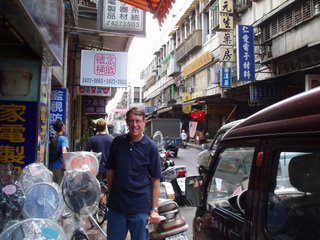
Off we went on an organized excursion to Taipei (prounounced Tay-bay in Chinese), slightly less than an hour from Keelung. We began the trip with a visit to Taipei 101, the world's tallest building (cost: $1.7 billion). From the observation tower one gets a dizzying view of the whole city, crammed with modern constructions, temples, traffic and lovely parks.

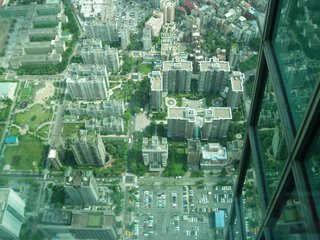
Taipei city, while "old" in general terms, is really a creation of the 1970s, when a building boom brought it fully into the late twentieth century. One sees Starbucks, McDonalds, Chiles, and other symbols of western globalization. The mall at Taipei 101 could be on Columbus Circle or in Westchester, full of stores like Bulgari, Prada, Dolce & Gabbana, etc. I saw a stunning purple jade necklace for a mere $50,000.
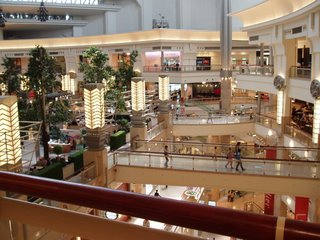
From there we visited the Chaing Kai Shek Memorial, an in-your-face statement of the US's support of anti-communist China (it was a "gift" from the US government, who supported CKS against Mao. On to dinner at a Mongolian Barbecue, followed by a visit to the tri-religion Wan Wa Long Shen Temple, a moving cultural experience where people from three faiths --Buddhism, Confucianism, Taoism-- came to worship. Intense aromas of incense and fresh food (offerings), beautiful music, much movement as people prayed. The students in the world religion class were particularly impresssed, since they had been studying these very religions in class. The building itself is dazzling, and it's not even one of the most beautiful of the Taiwanese temples, according to the guide books.
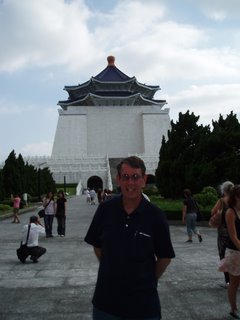
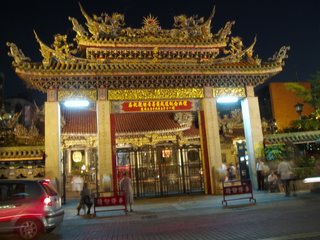
The infamous night market --with Snake Alley, where several students "enjoyed" fresh snake blood drinks (the snake is killed and drained before your eyes) -- is a collection of tourist junk and authentic shops, crowded with Taiwanese, full of the hustle-bustle of this city. In this picture you can see the cobra and the glasses of blood in the background; it's a revolting spectacle, of course.

July 5: Keelung-Taipei
Yesterday filled us with sights and sounds and smells, all of them a rich combination of the very old and the very new. Keelung, a port city, displays all of the energy, crowding, and bustle of most port cities.



Off we went on an organized excursion to Taipei (prounounced Tay-bay in Chinese), slightly less than an hour from Keelung. We began the trip with a visit to Taipei 101, the world's tallest building (cost: $1.7 billion). From the observation tower one gets a dizzying view of the whole city, crammed with modern constructions, temples, traffic and lovely parks.


Taipei city, while "old" in general terms, is really a creation of the 1970s, when a building boom brought it fully into the late twentieth century. One sees Starbucks, McDonalds, Chiles, and other symbols of western globalization. The mall at Taipei 101 could be on Columbus Circle or in Westchester, full of stores like Bulgari, Prada, Dolce & Gabbana, etc. I saw a stunning purple jade necklace for a mere $50,000.

From there we visited the Chaing Kai Shek Memorial, an in-your-face statement of the US's support of anti-communist China (it was a "gift" from the US government, who supported CKS against Mao. On to dinner at a Mongolian Barbecue, followed by a visit to the tri-religion Wan Wa Long Shen Temple, a moving cultural experience where people from three faiths --Buddhism, Confucianism, Taoism-- came to worship. Intense aromas of incense and fresh food (offerings), beautiful music, much movement as people prayed. The students in the world religion class were particularly impresssed, since they had been studying these very religions in class. The building itself is dazzling, and it's not even one of the most beautiful of the Taiwanese temples, according to the guide books.


The infamous night market --with Snake Alley, where several students "enjoyed" fresh snake blood drinks (the snake is killed and drained before your eyes) -- is a collection of tourist junk and authentic shops, crowded with Taiwanese, full of the hustle-bustle of this city. In this picture you can see the cobra and the glasses of blood in the background; it's a revolting spectacle, of course.

Monday, July 03, 2006
**********
July 4: Land!! We just sailed past Okinawa (starbord) on our way into Taiwan; we'll dock tomorrow at 8:00 am.

The weekend has been full of activity. The students are studying madly for their exams, both in their individual classes and in Global Studies.

Last night there was an extremely interesting and entertaining Cultural Pre-port session, information designed to help us "survive" in Taiwan and get the most of the four days the ship will be in port. The ship docks in Keelung, about an hour outside of Taipei by bus or train. I will do two of the excursions --a city tour, including a visit to Taipei 101, Chinese dinner with the group, Chaing Kai Shek Memorial, etc. on the 5th; Chinese Opera Company and School on the 6th-- then check into a hotel to position myself for my flight out on the 7th.

July 4: Land!! We just sailed past Okinawa (starbord) on our way into Taiwan; we'll dock tomorrow at 8:00 am.

The weekend has been full of activity. The students are studying madly for their exams, both in their individual classes and in Global Studies.

Last night there was an extremely interesting and entertaining Cultural Pre-port session, information designed to help us "survive" in Taiwan and get the most of the four days the ship will be in port. The ship docks in Keelung, about an hour outside of Taipei by bus or train. I will do two of the excursions --a city tour, including a visit to Taipei 101, Chinese dinner with the group, Chaing Kai Shek Memorial, etc. on the 5th; Chinese Opera Company and School on the 6th-- then check into a hotel to position myself for my flight out on the 7th.

Saturday, July 01, 2006
**********
July 1: Another pleasant surprise here is that there has been none of the drinking and carousing that I heard had happened on past voyages. S@S and the ship's crew have really buckled down on this (safety) issue; consequently there have been very few disciplinary incidents related to alcohol. The Executive Dean and the Academic Dean, working with a great team of Residence Life people, have instituted policies that control inappropriate behavior. For example, for mixers and socials students are permitted a set number of drinks, tickets for which they must purchase the day before. For the first mixer, some 800 tickets were sold; for the last two, a TOTAL of 100; the students are "getting it," choosing to understand the safety issue and to act responsibly. They still come to the socials and mixers, but are content with a beer or glass of wine (rather than 10 or more!). The Deans have been clear about their policies, and the Security Officer implements them. The Security Officer's wife tells me that this voyage is very different from her previous experience because the students are more serious, more self-controlled, and more interested in integrating the academic part of the trip with the experiential, in-country part. What a relief.
**********
July 2: Sunday, "Sea Olympics." Today all the ship's participants --students, faculty, administrators, Teachers at Sea, the senior passengers-- will be involved in a series of goofy competitions (trivia contest, whistling with crackers, passing an orange, etc.), followed by a long study session and review session for the upcoming test in Global Studies.

"Real World" did a lot of damage to Semester at Sea's reputation that is only now starting to right itself. UVa's insistence on added work and more serious academics have already paid off in significant ways, and I only see it getting better. Faculty who have sailed with Semester at Sea before have been commenting on the difference; I don't think UVa can take credit for this, since improvements have been seeping into Semester at Sea's activities for the last few years. I've been reading past faculty and Dean reports, and I'm impressed with how suggestions have been incorporated into the program. In truth, it sounded pretty scary (party! drink!) before.
July 1: Another pleasant surprise here is that there has been none of the drinking and carousing that I heard had happened on past voyages. S@S and the ship's crew have really buckled down on this (safety) issue; consequently there have been very few disciplinary incidents related to alcohol. The Executive Dean and the Academic Dean, working with a great team of Residence Life people, have instituted policies that control inappropriate behavior. For example, for mixers and socials students are permitted a set number of drinks, tickets for which they must purchase the day before. For the first mixer, some 800 tickets were sold; for the last two, a TOTAL of 100; the students are "getting it," choosing to understand the safety issue and to act responsibly. They still come to the socials and mixers, but are content with a beer or glass of wine (rather than 10 or more!). The Deans have been clear about their policies, and the Security Officer implements them. The Security Officer's wife tells me that this voyage is very different from her previous experience because the students are more serious, more self-controlled, and more interested in integrating the academic part of the trip with the experiential, in-country part. What a relief.
**********
July 2: Sunday, "Sea Olympics." Today all the ship's participants --students, faculty, administrators, Teachers at Sea, the senior passengers-- will be involved in a series of goofy competitions (trivia contest, whistling with crackers, passing an orange, etc.), followed by a long study session and review session for the upcoming test in Global Studies.

"Real World" did a lot of damage to Semester at Sea's reputation that is only now starting to right itself. UVa's insistence on added work and more serious academics have already paid off in significant ways, and I only see it getting better. Faculty who have sailed with Semester at Sea before have been commenting on the difference; I don't think UVa can take credit for this, since improvements have been seeping into Semester at Sea's activities for the last few years. I've been reading past faculty and Dean reports, and I'm impressed with how suggestions have been incorporated into the program. In truth, it sounded pretty scary (party! drink!) before.
Friday, June 30, 2006
**********
June 30: We are currently 2300 miles W of Honolulu, 1235 miles SE of Tokyo. I was invited to the Captain's Dinner last night, an elegant affair with superior food; interesting guy (Jeremy Kingston, from Ascot, England, currently living in the Philippines). It lasted for several hours, quite lively.
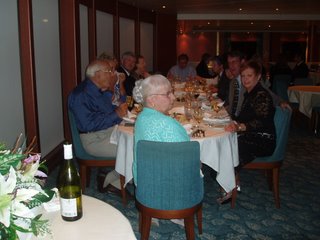 Today I made it my mission to check out the various offices and business spaces on the ship. There is an excellent hospital down on deck 2, well equipped and ready for most medical situations, staffed by a doctor and a nurse practitioner.
Today I made it my mission to check out the various offices and business spaces on the ship. There is an excellent hospital down on deck 2, well equipped and ready for most medical situations, staffed by a doctor and a nurse practitioner.
A faculty meeting (grappling with the eternal problem of the Global Studies course) led to dinner and an extremely animated conversation about the arts and arts funding in the US compared with other countries.
The food is surprisingly good, and the students seem to like it (many said it was much better than the food in their home institutions). There is always fresh salad, lots of vegetables and vegetarian possibilities, a fish dish, a meat dish, pasta, potatoes and rice (if you're on a non-carb diet, forget it!). Plus juices, iced tea, and desserts.

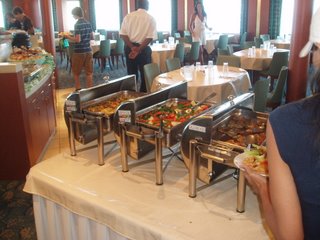

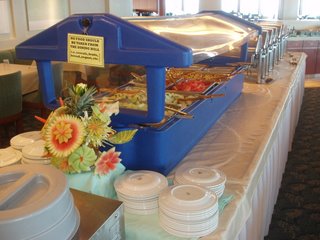 Tonight's "Community College" presentation was by one of the senior passengers, a guy who served in Vietnam in 1968-1969; he did a powerpoint on his experiences there at Cameron Bay, and expressed his deep interest in seeing what Vietnam looked like today, nearly 40 years later.
Tonight's "Community College" presentation was by one of the senior passengers, a guy who served in Vietnam in 1968-1969; he did a powerpoint on his experiences there at Cameron Bay, and expressed his deep interest in seeing what Vietnam looked like today, nearly 40 years later.
A faculty-student mixer followed. The students are genuinely excited about all of this, extremely complimentary of their teachers (several, in particular, have impressive credentials and an engaging teaching style), and not daunted by the reading, even after UVa demanded that many of the syllabi be pumped up with more reading. There are whiners, to be sure, students who simply want to party and "have a good time," but the overwhelming majority of the students are serious about this adventure, taking their classes seriously, and performing no better and no worse than they do at home. This has been a surprise to me, particularly given some of the criticisms we have all heard about Semester at Sea. On the whole, these are very good students.
June 30: We are currently 2300 miles W of Honolulu, 1235 miles SE of Tokyo. I was invited to the Captain's Dinner last night, an elegant affair with superior food; interesting guy (Jeremy Kingston, from Ascot, England, currently living in the Philippines). It lasted for several hours, quite lively.
 Today I made it my mission to check out the various offices and business spaces on the ship. There is an excellent hospital down on deck 2, well equipped and ready for most medical situations, staffed by a doctor and a nurse practitioner.
Today I made it my mission to check out the various offices and business spaces on the ship. There is an excellent hospital down on deck 2, well equipped and ready for most medical situations, staffed by a doctor and a nurse practitioner.A faculty meeting (grappling with the eternal problem of the Global Studies course) led to dinner and an extremely animated conversation about the arts and arts funding in the US compared with other countries.
The food is surprisingly good, and the students seem to like it (many said it was much better than the food in their home institutions). There is always fresh salad, lots of vegetables and vegetarian possibilities, a fish dish, a meat dish, pasta, potatoes and rice (if you're on a non-carb diet, forget it!). Plus juices, iced tea, and desserts.



 Tonight's "Community College" presentation was by one of the senior passengers, a guy who served in Vietnam in 1968-1969; he did a powerpoint on his experiences there at Cameron Bay, and expressed his deep interest in seeing what Vietnam looked like today, nearly 40 years later.
Tonight's "Community College" presentation was by one of the senior passengers, a guy who served in Vietnam in 1968-1969; he did a powerpoint on his experiences there at Cameron Bay, and expressed his deep interest in seeing what Vietnam looked like today, nearly 40 years later.A faculty-student mixer followed. The students are genuinely excited about all of this, extremely complimentary of their teachers (several, in particular, have impressive credentials and an engaging teaching style), and not daunted by the reading, even after UVa demanded that many of the syllabi be pumped up with more reading. There are whiners, to be sure, students who simply want to party and "have a good time," but the overwhelming majority of the students are serious about this adventure, taking their classes seriously, and performing no better and no worse than they do at home. This has been a surprise to me, particularly given some of the criticisms we have all heard about Semester at Sea. On the whole, these are very good students.
Wednesday, June 28, 2006
June 28: DOES NOT EXIST!
June 29:
The technological sophistication of the ship has impressed me. The library -- contrary to all rational expectations -- is good. While there are few actual books, there is an endless wealth of resources available either on the Internet or via the Intranet system on board. Faculty can have all materials scanned and put into files, which students can read on their own laptops, in the library itself, or in the computer lab. Interlibrary loan (electronic delivery) works perfectly, and there are dozens of free sites that the students can access (country websites, newspapers, etc.) as well as ALL of the databases through the UVa library system. So, no problem with student/faculty research.
All public spaces have wireless connections, and access to the Internet and e-mail is usually quick and effort-free (there is an IT consultant on board, to resolve the inevitable problems). The downside is that the number of "free" e-mail/Internet minutes is limited, and costly if/when one goes over that limit.


Most students use cybercafes from the ports they visit to get caught up.
Phone services are available, as well. A $20 phone card allows for 13 minutes of talk, which can be done from your room. People can buy satellite phones (prior to boarding) that work during the whole voyage (some students have purchased them; they are pricey, but they work).
When the ship was outfitted with the new technology (computers, servers, cables, etc.), it added one ton to the total weight.
All rooms have TVs, connected to the internal loop which enable the projection of announcements, films and educational videos, and language materials throughout the day.
The auditorium is fully equipped with sound, computer, laptop, music and other technologies, and staffed with a full-time person to facilitate powerpoint (or other) presentations.

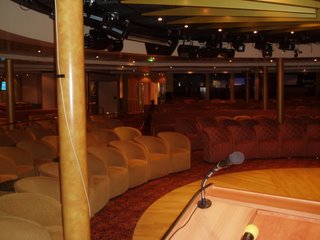
Most classrooms are computer friendly: laptop, largescreen projection, sound; some have overhead projectors, maps, and the like.



June 29:
The technological sophistication of the ship has impressed me. The library -- contrary to all rational expectations -- is good. While there are few actual books, there is an endless wealth of resources available either on the Internet or via the Intranet system on board. Faculty can have all materials scanned and put into files, which students can read on their own laptops, in the library itself, or in the computer lab. Interlibrary loan (electronic delivery) works perfectly, and there are dozens of free sites that the students can access (country websites, newspapers, etc.) as well as ALL of the databases through the UVa library system. So, no problem with student/faculty research.

All public spaces have wireless connections, and access to the Internet and e-mail is usually quick and effort-free (there is an IT consultant on board, to resolve the inevitable problems). The downside is that the number of "free" e-mail/Internet minutes is limited, and costly if/when one goes over that limit.


Most students use cybercafes from the ports they visit to get caught up.
Phone services are available, as well. A $20 phone card allows for 13 minutes of talk, which can be done from your room. People can buy satellite phones (prior to boarding) that work during the whole voyage (some students have purchased them; they are pricey, but they work).
When the ship was outfitted with the new technology (computers, servers, cables, etc.), it added one ton to the total weight.
All rooms have TVs, connected to the internal loop which enable the projection of announcements, films and educational videos, and language materials throughout the day.
The auditorium is fully equipped with sound, computer, laptop, music and other technologies, and staffed with a full-time person to facilitate powerpoint (or other) presentations.


Most classrooms are computer friendly: laptop, largescreen projection, sound; some have overhead projectors, maps, and the like.



June 27. Some higher seas last night rocked and rolled us a little, but no problem. I did a full day of classes today, which were quite engaging (Anthropology of Southeast Asia, Pacific Rim novels). Core had a first-rate presentation on the Chinese "one child" birth policies (woman from Cornell). Rest of the day dedicated to doing some reading, working on my own stuff, and trying to do some exercise.
 One great thing is that I'm finding time to do my own work, something I didn't think was going to be possible; even the teaching faculty seems to have some time to themselves.
One great thing is that I'm finding time to do my own work, something I didn't think was going to be possible; even the teaching faculty seems to have some time to themselves.
Tonight I had a dinner for the UVa students, just to meet them and get a sense of how the voyage is going; I ordered a birthday cake for one of them, which we all enjoyed, then shared with some of their friends.
 There is a grumbling from some students and faculty about the reading load, but I just smile and nod my head. There IS a lot to do, given the time constraints, class schedules, and other activities, but the good students are taking it in stride. As usual, the UVa students arae full of wise suggestions and ways to make this even better next time around.
There is a grumbling from some students and faculty about the reading load, but I just smile and nod my head. There IS a lot to do, given the time constraints, class schedules, and other activities, but the good students are taking it in stride. As usual, the UVa students arae full of wise suggestions and ways to make this even better next time around.
Side deck, mid-afternoon.

 One great thing is that I'm finding time to do my own work, something I didn't think was going to be possible; even the teaching faculty seems to have some time to themselves.
One great thing is that I'm finding time to do my own work, something I didn't think was going to be possible; even the teaching faculty seems to have some time to themselves.Tonight I had a dinner for the UVa students, just to meet them and get a sense of how the voyage is going; I ordered a birthday cake for one of them, which we all enjoyed, then shared with some of their friends.
 There is a grumbling from some students and faculty about the reading load, but I just smile and nod my head. There IS a lot to do, given the time constraints, class schedules, and other activities, but the good students are taking it in stride. As usual, the UVa students arae full of wise suggestions and ways to make this even better next time around.
There is a grumbling from some students and faculty about the reading load, but I just smile and nod my head. There IS a lot to do, given the time constraints, class schedules, and other activities, but the good students are taking it in stride. As usual, the UVa students arae full of wise suggestions and ways to make this even better next time around.Side deck, mid-afternoon.

Tuesday, June 27, 2006
June 25: I'm finding the rhythm of the ship, and the good news is that there's time for everything: classes, meetings, discussions, reading, relaxation, meals. The students take Global Studies (everyone is supposed to show up for this; some do not), then take two other classes of their choosing, spread out during the day. I've heard some complaining about the difficulty or length of the readings, but I'm not impressed with the whining, and in fact, think it's not only doable but also reasonable. (actually, only one student -- from Pitt-- has complained; others tell me it's "a lot" but not a problem). By 5:00 everyone is out doing exercise or napping or reading or chilling, and they reassemble again between 5 and 7 for dinner. More "free" time, then (tonight, for example, mandatory) meetings and evening activities. I'm pleasantly surprised to see more students than I thought --given the criticism I've heard-- actually sitting around the various spaces reading or writing.
The library, while small, is efficient and seemingly helpful. Lots of DVDs, videos, reference works, and of course, they have access to the internal loop that can provide materials on Toolkit. The computer lab is also small, but serviceable, and student wireless laptops can be used in any public space on the boat.
The faculty members are working hard, but everyone seems to be enjoying it. They obviously love to teach and interact with students, and most are engaging lecturers. I was lead to believe, however, that there would be NO time for individual work, but that's simply not the case. Faculty teach two courses, attend Global Studies, do 3-5 presentations in Global Studies sprinkled throughout the voyage (short ones in their areas of expertise, related to the countries being visited), and lead field programs of their choosing in ports (IES does all of the logistical work for these; faculty members need only decide what they want to do). There is time to wind down, grade, read, and do individual work. Anyone who comes prepared, even given the dramatic changes in schedule that can occur, will have no problem carving out space for reading, research, or relaxation.
June 26: Today is "No Class Day" (I've already suggested that they redub it "Reading Day," in the UVa tradition), and the students had a barbeque lunch by the pool, play and reading time, class pictures, and a social.
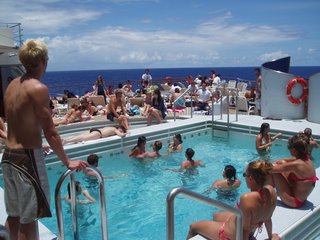

A number of them take time to catch up on the reading whenever they can.

There are 11 UVa students on board this summer (Pitt has the largest crew, another large one from U Colorado, then a bunch sprinkled all across the US from UCLA to Drew, U Maryland to U Washington, and dozens of spots in between. Nice kids (most of them) and they seem ready to take the academics seriously, balancing it, as is perfectly natural, with the extraordinary adventure that this is.
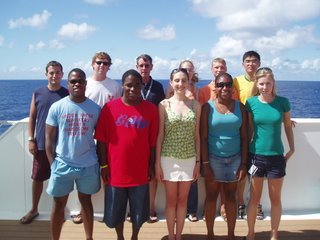
I just called Janna, from the telephone in my room. Bought a satellite phone card for $20, which gives you 13 minutes of quite good communication. And we're 1000 miles west of Hawaii, in the middle of the Pacific Ocean! There's a 7-hour time difference now, 8 as of tomorrow. Apparently, "Wednesday" simply disappears when we cross the International Date Line.
The library, while small, is efficient and seemingly helpful. Lots of DVDs, videos, reference works, and of course, they have access to the internal loop that can provide materials on Toolkit. The computer lab is also small, but serviceable, and student wireless laptops can be used in any public space on the boat.
The faculty members are working hard, but everyone seems to be enjoying it. They obviously love to teach and interact with students, and most are engaging lecturers. I was lead to believe, however, that there would be NO time for individual work, but that's simply not the case. Faculty teach two courses, attend Global Studies, do 3-5 presentations in Global Studies sprinkled throughout the voyage (short ones in their areas of expertise, related to the countries being visited), and lead field programs of their choosing in ports (IES does all of the logistical work for these; faculty members need only decide what they want to do). There is time to wind down, grade, read, and do individual work. Anyone who comes prepared, even given the dramatic changes in schedule that can occur, will have no problem carving out space for reading, research, or relaxation.
June 26: Today is "No Class Day" (I've already suggested that they redub it "Reading Day," in the UVa tradition), and the students had a barbeque lunch by the pool, play and reading time, class pictures, and a social.


A number of them take time to catch up on the reading whenever they can.

There are 11 UVa students on board this summer (Pitt has the largest crew, another large one from U Colorado, then a bunch sprinkled all across the US from UCLA to Drew, U Maryland to U Washington, and dozens of spots in between. Nice kids (most of them) and they seem ready to take the academics seriously, balancing it, as is perfectly natural, with the extraordinary adventure that this is.

I just called Janna, from the telephone in my room. Bought a satellite phone card for $20, which gives you 13 minutes of quite good communication. And we're 1000 miles west of Hawaii, in the middle of the Pacific Ocean! There's a 7-hour time difference now, 8 as of tomorrow. Apparently, "Wednesday" simply disappears when we cross the International Date Line.
Saturday, June 24, 2006
Semester at Sea (trial run: Honolulu to Taiwan)
June 22: Left Charlottesville at 6:00 am, to DC, to LA (long layover), to Honolulu, arriving at 8:30 local time (2:30 am Ch'ville time). Go to my hotel, wandered around a little, then to bed. My room, a corner on the top floor overlooking Diamondhead Mountain and Waikiki Beach, looked like this at sunrise.
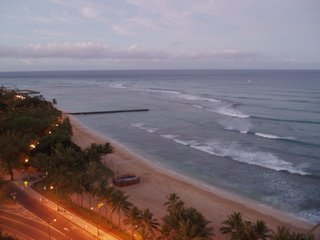
I got a tattoo (more on this later). In the morning I took a long walk up and down the beach, had lunch at the gorgeous Sheraton Waikiki hotel.

and came in for a rest, took more pictures at midmorning



before going off to lunch with friends. Then, to the ship.
The Explorer is quite something. It's pristine clean, new (build in 2002), gorgeously appointed, and beautifully designed. I was settled into my balcony suite


then given a tour of the ship by the Executive Director of this voyage. It has everything: classrooms, cafeterias and dining halls, library, campus store, computer lab (20 terminals), exercise areas, public spaces, a pool, a spa (massages and steam room), and so on. All small spaces, of course, but utilitarian.
I went outside to forage for some dinner and overhead two women talking about "A Taste of Honolulu," one of those fund-raisers that allow one to sample good dishes from a zillion restaurants. So, of course, I went. It was in a lovely park, full of people and entertainment. That's where I got the tattoo -- a Chinese lion, representing the zodiac sign Leo.
 I was extremely pleased when, later in the evening, one of the Chinese experts on the ship asked me, "Why do you have a lion tattoo'd to your neck?" Imagine how shocked I would have been if she had asked me, "Why does it say 'This guy is an idiot' on your neck?!" It's created quite a stir among the students and staff, as you can imagine. After chatting with some of the faculty in the faculty lounge I hit the hay. We took off at midnight, and while I noted the rocking of the ship as we sailed, I slept peacefully and well. This morning, fine, although I'm wearing the bracelets and I've taken Bonine to ward off the evil effects of sea sickness; but so far, other than that vague dizzy sensation one can get, it's been fine.
I was extremely pleased when, later in the evening, one of the Chinese experts on the ship asked me, "Why do you have a lion tattoo'd to your neck?" Imagine how shocked I would have been if she had asked me, "Why does it say 'This guy is an idiot' on your neck?!" It's created quite a stir among the students and staff, as you can imagine. After chatting with some of the faculty in the faculty lounge I hit the hay. We took off at midnight, and while I noted the rocking of the ship as we sailed, I slept peacefully and well. This morning, fine, although I'm wearing the bracelets and I've taken Bonine to ward off the evil effects of sea sickness; but so far, other than that vague dizzy sensation one can get, it's been fine.
June 23: Breakfast was an awesome buffet of fresh fruit salad, dry cereals and cream of wheat, juices, coffee, milk, omelettes, hash browns, pancakes, sausage, scrambled eggs, toast, croissants, sweet rolls, English muffins, bagels, peanut butter, jelly, yogurt, and the like. Having it out on the back deck isn't exactly punishment.

Following Global Studies class (an engaging lecture on the global economy, with specific examples taken from the Pacific Rim counties the ship will be visiting, plus a quick overview of Chinese art in preparation for the visit to Taiwan). The students are complaining about the amount of reading they have to do, but it looks reasonable to me. Most say they're keeping up with it, and I do indeed see a lot of them sitting around reading. Classes are sprinked throughout the day, from 8:00 to 5:00.


Lunch was also very good: lots of fresh salad, vegetables, fish, meat , potatoes, fruit. I think one of the challenges will be to find time and space for exercise (you can't do a walk loop around the decks, without going inside and outside several times; I don't use the workout machines, which are, at any rate, booked up most of the day; there's a small basketball court outside). I signed up for a tour of the bridge, which was really impressive (instrumentation, documentation, professionalism). Dining room and faculty lounge:


I'm taking the afternoon "off" to do some of my own work. There is a Dean's reception today at 5, followed by dinner (too early for my tastes), then evening activities which I'll discover later. Skipped dinner (the reception was very nice), did some e-mail, then went to "Community College" to learn how to post a blog. It was pretty interesting; from there, to the faculty lounge for a drink with the troops, and quit. I have a little time to settle in to read and take notes, then to bed.
June 25: I'm finding the rhythm of the ship, and the good news is that there's time for everything: classes, meetings, discussions, reading, relaxation, meals. There are slightly fewer than 300 students, plus about 30 "senior" participants, and a group of teachers. Each unit is directed and lead by someone else, but the groups intersect in terrific ways (everyone goes to Global Studies, for example).
June 22: Left Charlottesville at 6:00 am, to DC, to LA (long layover), to Honolulu, arriving at 8:30 local time (2:30 am Ch'ville time). Go to my hotel, wandered around a little, then to bed. My room, a corner on the top floor overlooking Diamondhead Mountain and Waikiki Beach, looked like this at sunrise.

I got a tattoo (more on this later). In the morning I took a long walk up and down the beach, had lunch at the gorgeous Sheraton Waikiki hotel.

and came in for a rest, took more pictures at midmorning



before going off to lunch with friends. Then, to the ship.
The Explorer is quite something. It's pristine clean, new (build in 2002), gorgeously appointed, and beautifully designed. I was settled into my balcony suite


then given a tour of the ship by the Executive Director of this voyage. It has everything: classrooms, cafeterias and dining halls, library, campus store, computer lab (20 terminals), exercise areas, public spaces, a pool, a spa (massages and steam room), and so on. All small spaces, of course, but utilitarian.
I went outside to forage for some dinner and overhead two women talking about "A Taste of Honolulu," one of those fund-raisers that allow one to sample good dishes from a zillion restaurants. So, of course, I went. It was in a lovely park, full of people and entertainment. That's where I got the tattoo -- a Chinese lion, representing the zodiac sign Leo.
 I was extremely pleased when, later in the evening, one of the Chinese experts on the ship asked me, "Why do you have a lion tattoo'd to your neck?" Imagine how shocked I would have been if she had asked me, "Why does it say 'This guy is an idiot' on your neck?!" It's created quite a stir among the students and staff, as you can imagine. After chatting with some of the faculty in the faculty lounge I hit the hay. We took off at midnight, and while I noted the rocking of the ship as we sailed, I slept peacefully and well. This morning, fine, although I'm wearing the bracelets and I've taken Bonine to ward off the evil effects of sea sickness; but so far, other than that vague dizzy sensation one can get, it's been fine.
I was extremely pleased when, later in the evening, one of the Chinese experts on the ship asked me, "Why do you have a lion tattoo'd to your neck?" Imagine how shocked I would have been if she had asked me, "Why does it say 'This guy is an idiot' on your neck?!" It's created quite a stir among the students and staff, as you can imagine. After chatting with some of the faculty in the faculty lounge I hit the hay. We took off at midnight, and while I noted the rocking of the ship as we sailed, I slept peacefully and well. This morning, fine, although I'm wearing the bracelets and I've taken Bonine to ward off the evil effects of sea sickness; but so far, other than that vague dizzy sensation one can get, it's been fine.June 23: Breakfast was an awesome buffet of fresh fruit salad, dry cereals and cream of wheat, juices, coffee, milk, omelettes, hash browns, pancakes, sausage, scrambled eggs, toast, croissants, sweet rolls, English muffins, bagels, peanut butter, jelly, yogurt, and the like. Having it out on the back deck isn't exactly punishment.

Following Global Studies class (an engaging lecture on the global economy, with specific examples taken from the Pacific Rim counties the ship will be visiting, plus a quick overview of Chinese art in preparation for the visit to Taiwan). The students are complaining about the amount of reading they have to do, but it looks reasonable to me. Most say they're keeping up with it, and I do indeed see a lot of them sitting around reading. Classes are sprinked throughout the day, from 8:00 to 5:00.


Lunch was also very good: lots of fresh salad, vegetables, fish, meat , potatoes, fruit. I think one of the challenges will be to find time and space for exercise (you can't do a walk loop around the decks, without going inside and outside several times; I don't use the workout machines, which are, at any rate, booked up most of the day; there's a small basketball court outside). I signed up for a tour of the bridge, which was really impressive (instrumentation, documentation, professionalism). Dining room and faculty lounge:


I'm taking the afternoon "off" to do some of my own work. There is a Dean's reception today at 5, followed by dinner (too early for my tastes), then evening activities which I'll discover later. Skipped dinner (the reception was very nice), did some e-mail, then went to "Community College" to learn how to post a blog. It was pretty interesting; from there, to the faculty lounge for a drink with the troops, and quit. I have a little time to settle in to read and take notes, then to bed.
June 25: I'm finding the rhythm of the ship, and the good news is that there's time for everything: classes, meetings, discussions, reading, relaxation, meals. There are slightly fewer than 300 students, plus about 30 "senior" participants, and a group of teachers. Each unit is directed and lead by someone else, but the groups intersect in terrific ways (everyone goes to Global Studies, for example).